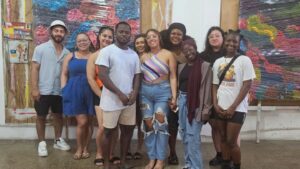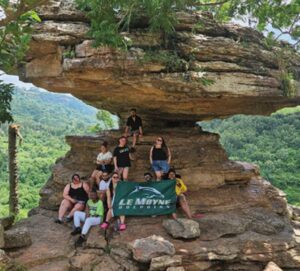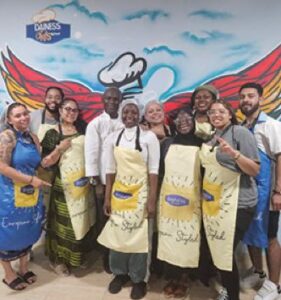A New Perspective

When Bianka Pena’s adviser, KL Lane, suggested that she take a course titled West African Women Writers, it did not take much to persuade her. Pena ’26, a psychology major from Santo Domingo, Dominican Republic, has always loved literature that, as she put it, “tackles real issues.” Even so, the class, which was taught by 75th Anniversary Endowed Professor of the Humanities Norrell Edwards, Ph.D., surpassed all of her expectations. Not only did Pena and her classmates read arresting works by a number of remarkable authors, but they were also encouraged to immerse themselves in those stories in order to find patterns, connect ideas, and open themselves to new possibilities.
 The class concluded with a weeklong trip to Ghana, where the students grew to better understand the spaces and places that influenced the authors whose works they’d read. The undergraduates studied and carefully critiqued different works of art, looking for the meaning in each piece. They also visited historic sites, like the solemn Cape Coast Castle, where millions of enslaved Africans were held prior to boarding slave ships bound for the New World. It was there that they saw what is known as The Door of No Return, through which those people were forced to leave, and its opposite side, The Door of Return, which today represents the returns of enslaved African descendants and reconciliation with this horrific past. In short, as Pena put it, the students “stepped out of their comfort zones.”
The class concluded with a weeklong trip to Ghana, where the students grew to better understand the spaces and places that influenced the authors whose works they’d read. The undergraduates studied and carefully critiqued different works of art, looking for the meaning in each piece. They also visited historic sites, like the solemn Cape Coast Castle, where millions of enslaved Africans were held prior to boarding slave ships bound for the New World. It was there that they saw what is known as The Door of No Return, through which those people were forced to leave, and its opposite side, The Door of Return, which today represents the returns of enslaved African descendants and reconciliation with this horrific past. In short, as Pena put it, the students “stepped out of their comfort zones.”
Spending a semester abroad while I was in college allowed me to execute on years of French language acquisition. Students must operationalize learned concepts. I am a deep believer in [Brazilian educator and philosopher] Paulo Freire’s concept of ‘true dialogue’ as a vehicle for learning. What truer dialogue could students experience in Ghana than engaging with the people, place, and culture for themselves?
Edwards herself is a prolific storyteller, but she wanted her students to learn Ghana’s stories for themselves. She recalls a faculty member telling her: “You’re making their world bigger [with the classes you teach].” Those words remained in Edwards’ mind as she watched students grapple with their assumptions and preconceived notions about Ghana and the African continent. They were “mesmerized by Ghanaian hospitality but also critical of their privilege as U.S. tourists.”
“Transformative, global experiences are a critical aspect of learning,” she said.
 Kiarra Reyes ’26, a biology major from the Poconos in Pennsylvania, said that she never would have dreamed of traveling to Africa at 19 years old, but was grateful the class made it possible. She called her time exploring Ghana “unforgettable.” She was particularly struck by their visit to Cape Coast Castle. It was an emotional day, she recalled, but one that reminded her just how much of our collective past can be hidden.
Kiarra Reyes ’26, a biology major from the Poconos in Pennsylvania, said that she never would have dreamed of traveling to Africa at 19 years old, but was grateful the class made it possible. She called her time exploring Ghana “unforgettable.” She was particularly struck by their visit to Cape Coast Castle. It was an emotional day, she recalled, but one that reminded her just how much of our collective past can be hidden.
“I was able to see where such an important part of history took place, and I was able to feel all those emotions of anger, sadness, and empathy.” she said. “The knowledge I gained from this trip is something I will carry with me for the rest of my life.”
Pena echoed those sentiments. She hopes that her first trip to Ghana will not be her last. She would like to return to the nation in the future, either as a doctor caring for people there or as a tourist soaking up the culture and supporting the local economy.
“Experiences like these are crucial for students like me,” she said. “They enable us to learn about history and better understand our own privilege. During my time in Ghana, I witnessed the reality of life for many, including children who often lack access to basic necessities like food. My time there allowed me to appreciate [life’s] beauty and gain valuable insights…It changed who I am as a person.”
Changing World Views
Students in this African Women Writers class truly experienced a transformational visit to Ghana.
Travel the World Beyond the Heights
Have you ever dreamed of immersing yourself in another culture, experiencing the world through the eyes of a community so very different from your own?


